PHIFP Fellow and Alumni Biographies
Tony Winters, MSPH

Fellowship Assignment: Lehigh Valley Health Network and Allentown Health Bureau; Allentown, Pennsylvania
As a PHIFP fellow, Tony will work with the Lehigh Valley Health Network (LVHN) and the Allentown Health Bureau as they develop cross sector partnerships and will provide support as LVHN develops a new analytics center focused on integrating social determinants of health data with healthcare data to improve the health of the local community. In addition, Tony will work with the Allentown Health Bureau to develop a systems modernization strategy that will recommend tools and processes aimed at modernizing data and technology within the Health Bureau to support its mission to prevent disease and injury and to protect and promote the public’s health.
Prior to his fellowship, Tony worked as and ORISE fellow and contractor with the Division of Health Informatics and Surveillance providing informatics support as part of the modernization of the Nationally Notifiable Diseases Surveillance System (NNDSS). In his work with the NNDSS Modernization Initiative, Tony lead an interdisciplinary team of vocabulary specialists, messaging analysts, and system developers to implement methods to systematically receive data into NNDSS. Tony has experience collaborating and engaging with a variety of stakeholders across CDC and CDC partners in identifying solutions to meet national surveillance needs and disease monitoring.
Tony earned a Master of Science in Public Health degree in applied epidemiology from the University of Alabama at Birmingham.
Juliet Adeola, MS, MBA, Bsc

Fellowship Assignment: Population Health Workforce Branch (PHWB), Division of Scientific Education and Professional Development (DSEPD)
As a PHI Fellow, Juliet will improve strategic planning and operations in informatics and data science projects. She will support high-priority projects at CDC around public health surveillance, outbreak response, and/or data analytics. Juliet will contribute her informatics and data science knowledge/expertise within the agency for COVID-19 response and other Public Health Emergency Response activities.
Prior to her Fellowship, Juliet worked as a Technical Advisor and Unit Head in Health Informatics. She worked at Health Information Management Services (HMIS) at APIN Public Health Initiatives (APIN), and as a CDC Implementing Partner providing HIV/AIDS treatment and prevention services in Nigeria. Her previous research, evaluation, and quality improvement projects focused on health services/patient outcomes, electronic medical record (EMR) systems (requirements review, implementation, and use), and mobile health technology interventions in Nigeria.
Her major achievements include rapid implementation and scale up of the Nigerian Medical Records Systems (an open source EMR platform) at over 600 health facilities across 8 states of Nigeria. As part of the efforts to achieve identity assurance in HIV Care and enhance existing EMR capabilities, Juliet led the development and implementation of a groundbreaking web-based Patient Biometric Solution (PBS) in Nigeria.
Juliet earned her master’s degree in Health Services & Outcomes Research at Northwestern University, a master’s degree in Business Administration at the University of Sunderland, and a bachelor’s degree in Computer Science at the University of Calabar.
Omar Ali Al-Naimi, MD, DrPH

Fellowship Assignment: National Center for Chronic Disease Prevention and Health Promotion (NCCDPHP), Division of Reproductive Health (DRH)
As a PHI Fellow, Omar will help modernize the National ART Surveillance System (NASS) and improve its attributes while significantly reducing its operational costs. Following the detailed assessment of NASS, the project is aimed to integrate system’s input and output allowing prospective online reporting, automatic construction of output tables and graphs, immediate access to ART data by reporting clinics and ART Team, and integrated data cleaning and quality checks.
Prior to his CDC Fellowship, Omar worked as a medical doctor with more than 20 years of experience in medical practice, including 12 years in scientific research and 7 years in information technology and data science. He worked as a trauma surgeon in Iraq and developed early clinical decision support system for reducing poly-pharmacy. In the US, he worked for Columbia University and City University of NY as a researcher and accomplished four publications with one was considered by Hypertension Journal as novel research method. He worked for many companies as data scientist to develop machine learning algorithms for improving operational processes and quality assurance.
Omar earned a Doctoral degree in Epidemiology from Capella University in Minneapolis, Minnesota, Master’s degree in Biomedical and Health Informatics from the University of Illinois at Chicago, and MD degree from the University of Baghdad/Medical College in Iraq.
Philip Bammeke, MSc

Fellowship Assignment: National Center for Chronic Disease Prevention and Health Promotion (NCCDPHP), Office on Smoking and Health (OSH), Office of the Director (OD)
As a PHIFP Fellow, Philip will develop a data strategy plan aimed at enhancing OSH’s current data infrastructure and will recommend tools and processes to help modernize and strengthen the existing data systems for improved data collection, integration, visualization, use, and process management towards better/faster decision making processes.
Prior to his CDC Fellowship, Philip worked at African Field Epidemiology Network (AFENET) as a Data Manager designated to the National Polio Emergency Operations Center (NEOC) in Nigeria for 4 years. There, he coordinated the use of performance dashboards to monitor the quality of preparedness for polio mass vaccination campaigns in Nigeria as well as the use of mobile data technology to strengthen supportive supervision of the polio campaigns, supported the design and establishment of the polio data portal at the NEOC, and worked on the application of GIS to facilitate the use of location-based evidence to support and advance decision making processes on several projects. These—among other efforts as a key member of the NEOC Data Team as well as wider programmatic interventions—contributed to the laudable feat of Nigeria being certified Wild Polio Virus (WPV) free in August 2020.
Philip holds a master’s degree in environmental management from the University of Twente in The Netherlands and a post graduate certification in GIS and Geo-visualization also from the University of Twente’s Faculty of Geo-Information Science and Earth Observation (ITC).
Mohammed (Adam) Bouras, PhD, MSc

Fellowship Assignment: National Center for Chronic Disease Prevention and Health Promotion (NCCDPHP), Office of Informatics and Information Resources Management (OIIRM).
As a Public Health Informatics Fellow, Adam will participate in the OIIRM team’s efforts to leverage the NCCDPHP’s IT systems and surveillance modernization strategies. As part of this effort, Adam will participate in data modernization of the Pregnancy Risk Assessment Management System within the Division of Reproductive Health and Water Fluoridation Reporting System within the Division of Oral Health. He will also support OIIRM’s data science upskilling efforts, develop agile design thinking approaches for NCCDPHP, and serve as a co-lead on the NCCDPHP’s Informatics Journal Club.
Before joining PHIFP, Adam worked as Associate Project Director at the Department of Health Management and Informatics at the University of Missouri at the School of Medicine. He also worked as a Data Analyst Consultant for the Department of Social Services in Missouri.
He earned his PhD degree in informatics from the University of Missouri-Columbia, and dual Masters in Health Informatics and Health Administration from the same University, a Master in Agricultural Economics from the University of Connecticut, and a Master of Business Management from the Mediterranean Agronomic Institute of Chania in Greece.
Djibril Camara, MD, MPH
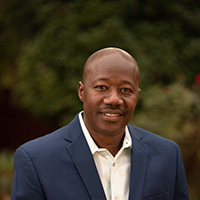
Fellowship Assignment: Agency Healthcare Quality and Research (AHRQ), Center for Evidence and Practice Improvement (CEPI)
As a PHIFP Fellow, Djibril works with AHRQ CEPI on a project aiming to build data capacity to conduct pragmatic Patient-Centered Outcomes Research (PCOR) by developing an interoperable electronic (e)Care plan to facilitate aggregation and sharing of critical patient-centered data across home, community, clinic, and research-based settings. Djibril brings both clinical and public health experiences as a physician with extensive experience working within diverse healthcare settings in Mali. In addition, he will bring public health expertise from his work with both the Virginia Department of Health and DC Health, where he focused on a range of areas including infectious and chronic diseases.
Before starting the PHIFP fellowship, he worked for eight years with health departments in Virginia and the District of Columbia. He recently served as an Epidemiologist with DC Health, where he managed the syndromic surveillance system, the infectious diseases surveillance system, led data exchanges (EHR and eCR), and the modernized the surveillance system. Djibril also worked as an analyst and database administrator for the Ryan White HIV/AIDS Program at DC Health, where he provided training and conducted data quality improvement projects across three states and D.C. At the Virginia Department of Health, he served as the state evaluator of Virginia Oral Health and the co-evaluator of a crosscutting chronic disease program for many years. Djibril also worked as a practicing physician in Mali while serving as a consultant for IntraHealth International on United States Agency for International Development (USAID) projects to reduce maternal and child mortality and to improve access to reproductive services.
Djibril holds a Medical Doctorate degree from the University of Bamako and a Master of Public Health degree with Epidemiology as a concentration from Rutgers School of Public Health. He speaks several foreign languages.
Dagoe Edward, MPH

Fellowship Assignment: Center for Global Health (CGH), Global Immunization Division (GID)
As a PHI fellow, Edward supports several projects such as development of data triangulation and interconnectivity between multiple independent information systems such as DHIS2, SORMAS (VPD surveillance system), Epi info (AFP reporting), as well as vaccine logistics and laboratory reporting databases, micro census for estimation of population data, supporting in the implementation of Growing Expertise in e-Health Knowledge and Skills (GEEKS) projects, data quality improvement, and general District Health Information Software 2 (DHIS2) optimization projects.
Prior to becoming a PHI fellow, Edward worked with Ghana Health Service (GHS) as a health information manager, supporting in the building and strengthening of several clinical and public health information systems including the DHIS2 and E-tracker roll out in the northern part of Ghana. He subsequently worked with the Stop Transmission of Polio (STOP) program as a data manager in Kenya where he worked on the maiden Immunization and VPD surveillance data specialist (ISDS) project, supporting the Kenyan government in strengthening Immunization and VPD Surveillance information systems and equally building capacity in the area of EPI and VPD Surveillance data management, quality, and use for decision making. Edward also worked with the African Field Epidemiology Network (AFENET) in Nigeria as a consultant data manager supporting in EPI data management and DHIS2 RI module optimization. In this position, he coordinated the maiden Growing Expertise in e-Health Knowledge and Skills (GEEKS) project implementation and successfully graduated the first tier 2 cohort in Nigeria.
Edward earned a Master’s degree in Public Health (MPH) from the Royal Tropical Institute (KIT) in Amsterdam-Netherlands.
Shideh Delrahim Ebrahim-Zadeh, MS, MPH

Fellowship Assignment: National Center for Environmental Health (NCEH); Division of Environmental Health Science and Practice (DEHSP)
As a PHIFP fellow, Shideh works with the Safe Food Section to develop tools for data cleaning, data ingestion, and generating automated reports for the environmental assessment data captured by CDC’s National Environmental Assessment Reporting System (NEARS). She also contributes to the building of a NEARS participants dashboard to support their surveillance and investigation activities. In addition to supporting NCEH research efforts, Shideh helps to develop a standard onboarding process for new NEARS users and supports the team in improving the CDC’s communication with NEARS users and to enhance collaboration between epidemiology and environmental health programs at the state and local levels. She also supports efforts to integrate NEARS and CDC’s Foodborne Disease Outbreak Surveillance System.
Prior to joining PHIFP, Shideh served as an ORISE Fellow in the Safe Food Section at the NCEH, managing and analyzing environmental assessment data. She also served at the Division of Global HIV and TB in the Center for Global Health, where she created data quality assurance and data-collection applications for projects related to the U.S. President’s Emergency Plan for AIDS Relief (PEPFAR).
Shideh earned a Master of Science degree in Statistics from Georgia Institute of Technology, Atlanta, and a Master of Public Health degree in Epidemiology from Emory University, Atlanta.
Euny Lee, PhD

Fellowship Assignment: Office of the Assistant Secretary for Planning and Evaluation (ASPE)
As a PHI Fellow, Euny works for ASPE, as part of the Health Policy Department. She works with partners from various HHS agencies on patient-centered outcomes research projects aimed at building data capacity for researchers.
Prior to her Fellowship, Euny was an adjunct assistant professor at the City University of New York. Her previous research, evaluation, and quality improvement projects focused on underserved populations, community health, and health disparities. At The Institute for Family Health, Grameen PrimaCare, and the ICAHN School of Medicine at Mount Sinai, she designed and analyzed needs assessment studies around health and technology, created a REDCap database, and provided grant and database management. Her previous experience also includes CME evaluation at the Healthcare Consultancy Group, biopharmaceuticals documentation at Medarex, and patient outcomes management at NYU Rusk Institute.
Euny earned her Doctoral degree in Biomedical Informatics at Rutgers University, a Master’s degree in Health Services Management and Policy at the New School, and a Bachelor’s degree in Sociology at CUNY Hunter College.
Roua El Kalach, B.S. Pharm., PharmD, BCPS

Fellowship Assignment: National Center for Immunization and Respiratory Diseases (NCIRD), Immunization Services Division (ISD)
As a PHI Fellow, Roua works with the Informatics Team in the Immunization Information Systems Support Branch within the Immunization Services Division. She is involved in multiple projects aimed at expanding and improving the functionality and integration of several vaccine tracking and management systems.
Prior to her Fellowship, Roua was a Clinical Health Information System Analyst at the American University of Beirut Medical Center serving in several informatics roles that include: leading the cutover for Epic EHR implementation, implementing and optimizing clinical decision support tools and workflows, building oncology treatment plans and working on projects that integrate Epic with other health information systems. Roua was initially a clinical pharmacist at AUBMC and an adjunct faculty/clinical preceptor in pharmacy practice at Lebanese American University (LAU).
Roua earned a Bachelor of Science in Pharmacy and a Doctor of Pharmacy (PharmD) from Lebanese American University (LAU). She is a Board Certified Pharmacotherapy Specialist (BCPS) and is Epic Care Ambulatory and Epic Beacon (oncology) Certified.
Neranga Liyanaarachchige, MD, MBBS

Fellowship Assignment: Division of Global HIV and TB (DGHT), Data Management, & Statistics Branch (HIDMSB)
As a PHI Fellow, Neranga will be developing a GEEKS Digital Case Study in “geospatial anonymization techniques to protect privacy and confidentiality”, developing a Health Information Exchange (HIE) simulation package for use in U.S. President’s Emergency Plan for AIDS Relief (PEPFAR) Virtual Academy Interoperability course, supporting the development of program- and learner- focused evaluation of informatics capacity development activities, developing Standard Occupation Codes for Health Informatics Professions, supporting PEPFAR countries to carry out Informatics-savvy organization assessment and also develop mechanisms to support the management of knowledge and information resources to improve the collaboration and program performance of the Health Informatics Team.
Prior to his Fellowship, Neranga worked as a Health Informaticist for the Ministry of Health, Sri Lanka. His work involved development of digital health strategy, national level health information systems evaluation, capacity development in digital health and coordinating the digital health response for COVID-19. His interests are digital health planning, data4Health, HIS evaluation and teaching digital health.
Neranga earned a Doctorate in Medicine (Health Informatics) in 2019 and Masters in Medical Informatics in 2014 from the Postgraduate Institute in Medicine, University of Colombo, Sri Lanka. He earned his MBBS from the Faculty of Medicine at University of Colombo, Sri Lanka. He is a TOGAF certified Enterprise Architect.
Daniel Tom-Aba, PhD, MPH

Fellowship Assignment: Center for Global Health (CGH), Global Immunization Division (GID)
As a PHI Fellow, Tom-Aba supports development, analysis, business logic and visualization of EMRO projects in the Polio Eradication branch (PEB).
Prior to his CDC Fellowship, Tom-Aba worked as a senior data scientist at the Helmholtz Centre for Infection Research in Germany in collaboration with the Hanover Medical School. He managed several application developments for infectious disease rapid response in West Africa and Europe.
Tom-Aba earned a doctoral degree in Epidemiology from Hannover Medical school Germany, a master’s degree in Public Health, Epidemiology and a double honors bachelor’s degree in Statistics and Computer Science. Tom-Aba’s main data science tools are R, Stata, Python, Power BI Development, and other web and app development tools including slack and GitHub for project management. Tom-Aba co-developed applications for Surveillance Outbreak Response Management and Analysis System (SORMAS), Polio campaign management and vaccine preventable disease systems in West Africa and Europe and has over 10 years of IT business analytics skills.
Gbedegnon Roseric Azondekon, PhD, MPH, MS

Fellowship Assignment: Center for Surveillance, Epidemiology, and Laboratory Services
As a PHIFP fellow, Roseric develops Natural Language Processing and Machine Learning methods for use with syndromic data and supports syndrome development and evaluation. Prior to his CDC fellowship, Roseric worked as a malaria research scientist at the Ministry of Health of the Republic of Benin. He managed and led many malaria vector control interventions, implemented, and coordinated mobile data collection systems in resource limited areas. He also worked at the University of Wisconsin Milwaukee as a Research Analyst, where he assisted in teaching bioinformatics curricula and developed applications for Next Generation Sequencing data analysis.
Roseric earned a doctoral degree in biomedical and health informatics, a master’s degree in applied medical and veterinary entomology, a master’s degree in public health, epidemiology, and a bachelor’s degree in biomedical science.
Uzay Kirbiyik, MD, MPH

Fellowship Assignment: Center for Surveillance, Epidemiology, and Laboratory Services, Division of Laboratory Services, Informatics and Data Science Branch
As a PHIFP fellow, Uzay improves laboratory data quality, timeliness, and enhancement. He supports the efforts in developing a laboratory interoperability roadmap; consolidating databases; increasing accessibility, the ease, and rate of data use. Uzay also analyzes laboratory-based opioid data for supporting the opioid response effort and opioid surveillance activities. Prior to his fellowship, Uzay worked on disease networks, including flu, genetic, and travel networks. He was involved in social network analysis as well.
Uzay earned a medical degree from Istanbul University, a master’s degree from Indiana University-Purdue University Indianapolis.
Zubin Khan, MHS

Fellowship Assignment: Center for Surveillance, Epidemiology, and Laboratory Services, Division of Scientific Education and Professional Development
As a PHIFP fellow, Zubin works for the Utah Department of Health, as part of CDC’s Population Health Workforce Initiative. He works on health information exchange, population health, and other innovative projects. Prior to his fellowship, Zubin worked in the department of U.S. Military HIV Research Program and serving as database administrator and health management information systems advisor to field locations in Africa. He served as an intern with the government of Liberia where he managed, collected, and analyzed data to assist in educating health workers using mhealth platform. He also worked at the National Institute of Virology (NIV), Department of Health in India where he was part of the epidemiology department as a lead IT technician.
Zubin earned a master’s degree in health sciences informatics research from Johns Hopkins University School of Medicine.
Elizabeth Hurley, MSc, BEng
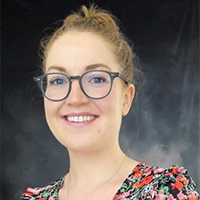
Fellowship assignment: National Center for Immunization and Respiratory Diseases, Immunization Services Division (ISD).
As a PHIFP Fellow, Elizabeth works between the Immunization Information Systems Support Branch and the Assessment Branch within the ISD. She is involved in multiple projects aimed at expanding and improving the functionality of several vaccine tracking and management systems, using GIS analysis to better understand vaccine distribution, and incorporating new technology to enable real-time information to be transmitted at national and state level. Prior to her fellowship, Elizabeth worked as a GIS analyst and water engineer in a number of international consultancies based in Dublin, Ireland.
Elizabeth earned a master’s degree in geographic information science from the Technical University of Ireland, Dublin, and a bachelor’s degree in civil engineering from the National University of Ireland, Galway.
Swati Sharma, MBA, MSPH
Fellowship assignment: Center for Global Health, Division of Global HIV & TB
As a PHIFP fellow, Swati works on health system strengthening by focusing on health workforce and human resource information systems. Prior to her fellowship, Swati worked as a business analyst, designing and implementing clinical information systems. She gained extensive experience in software development life cycle (SDLC) using agile methodology, conducting user demonstrations and acceptance testing. She also briefly worked as a healthcare management information system fellow with the National Health Systems Resource Center, Government of India where she primarily focused on supporting states for data reporting and analysis using District Health Information Software 2.
Swati earned a master’s degree in public health informatics from Emory University, Atlanta and a master’s degree in business administration from Symbiosis International University, India.
Sidoine Lafleur Kamgang, MS (MIS), MS (CS)
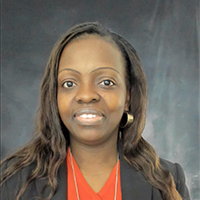
Fellowship assignment: National Center for Environmental Health
As a Public Health Informatics Fellow, Sidoine’s primary focus is the Environmental Public Health Tracking Network (Tracking Network). Tracking Network is a web-based surveillance system with components at CDC, in 25 states, and in New York City. Sidoine oversees website statistics data reporting from all the Tracking Network partners and develops tools to automatically aggregate statistics. She visualizes and sees trends across all recipients and the National Tracking Network in order to allow evaluation of Network outreach. Sidoine also contributes to the development of a public and private facing dashboard to allow the CDC’s Controlling Childhood Asthma, Reducing Emergencies (CCARE) program to monitor their goals. Prior to this fellowship, Sidoine worked with the Asthma and Community Health Branch at CDC where she streamlined the data reporting process, improved the data dissemination platform, and provided guidance in using information technology to enhance the asthma surveillance program.
Sidoine earned a master’s degree in management of information systems from the University of Picardie Jules Verne, France and a master’s degree of science in computer science from Georgia State University.
Lina Saintus, MPH

Fellowship assignment: Center for Global Health, Division of Global Health Protection
As a PHIFP fellow, Lina works on informatics projects for global and internal partners. Prior to her fellowship, she worked at the North Carolina Division of Public Health in the Communicable Disease Branch as the electronic laboratory reporting project manager.
Lina earned a master’s degree in public health from the University of North Florida.
James A. Salisi, MD MSc

Fellowship Assignment: Center for Global Health, Division of Global HIV & TB
As a PHIFP Fellow, James creates interoperability among existing health information systems, implements tools to improve workforce distribution, and assesses and uses quality controls to reinforce health information systems among Ministries of Health supported by President’s Emergency Plan for AIDS Relief.
Prior to his fellowship, James was a consultant at World Health Organization regional office for the western Pacific, providing technical support on nutrition and non-communicable diseases to the member states. He also worked as an HIV primary care physician with the NGO, Sustained Health Initiatives for the Philippines. He also worked as rural health physician with the Philippine Department of Health, researcher and project manager at the University of the Philippines Manila – National Telehealth Center, and consultant for various eHealth projects.
James earned a medical degree and bachelor’s degree from the University of the Philippines Manila, master’s degree in health informatics from Karolinska Institute and Stockholm University in Sweden, and a diploma in health systems and development from the Development Academy of the Philippines.
Garrett Fox, MPH

Fellowship assignment: Center for Global Health, Global Immunization Division
As a PHIFP fellow, Garrett works on standardizing data collection tools for global health surveys, modernizing data storage and cleaning practices, and building interactive dashboards/automated reports to enable more on-demand answers for project management and strategic decision-making. Prior to his fellowship, Garrett processed and analyzed data to identify potential overpayments and/or fraud occurring in state Medicaid programs at Myers and Stauffer, LLC; conducted a comprehensive study on the relationship between infant and young child feeding practices and undernutrition in rural El Salvador; and managed lab data and biospecimen repositories with American Cancer Society’s Epidemiology Research Program and Auburn University’s Diabetes and Metabolic Research Program.
Garrett earned a master’s degree in public health in global epidemiology from Emory University and a bachelor’s degree in biomedical sciences and Spanish from Auburn University.
Mayer Antoine, MS
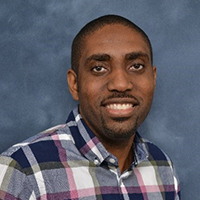
Fellowship Assignment: Center for Global Health, Division of Global HIV & TB
As a PHIFP fellow, Mayer works on several informatics projects in global health settings, such as the health information exchange architecture, HIV longitudinal data repository, and patient unique identifiers for HIV case surveillance. Prior to his CDC fellowship, he worked at the CDC Haiti country office for six years coordinating all database management systems activities, such as developing health information systems and managing the national data repository for HIV case-based surveillance. He has experience in software engineering, data management and analysis, and information technology project management.
Mayer holds a master’s degree in management of E-business from the University de Picardie Jules Vernes, France.
Mamadou Misbaou Diallo, MD

Fellowship Assignment: National Center for Injury Prevention and. Control (NCIPC), Division of Analysis, Research and Practice Integration (DARPI)
As a PHIFP fellow, Mamadou works with the Opioid and Informatics teams to design and develop tools for data ingestion, processing, and reporting on the Data Collation and Integration for Public Health Event Response (DCIPHER) platform. Mamadou also develops data transformation, linkage, integration and overlaying processes to allow for surveillance and investigation activities.
Dr. Diallo holds a doctoral degree from the University of Conakry, and a master of public health degree in epidemiology from Tulane University School of Public Health and Tropical Medicine. He practiced public health for many years and gained experience supporting systems for communicable diseases reporting, surveillance, and outbreak response, as well as providing analytic support for policy development.
Aldren Gonzales, MS

Fellowship Assignment: Office of Health Policy, Office of the Assistant Secretary for Planning and Evaluation
Aldren works with different agencies across the Department of Health and Human Services (HHS) on a number of Patient-Centered Outcome Research Institute (PCORI) projects that aim to build data capacity for researchers to do comparative clinical studies. The projects include standardizing laboratory data, developing training data for machine learning, generating synthetic data and extracting electronic health record data for public health use. Aside from the PCORI projects, he is also working on health policy research projects that explore emerging technologies and their applications to different HHS priority concerns as well as understanding different policy-related issues in implementing information systems and using digital health products.
Aldren holds a master’s degree in health informatics from the University of the Philippines. As his thesis project, he implemented a text message-based information service project for pregnant women and new mothers. While completing his graduate coursework, Aldren worked as program and research staff at the University of the Philippines – National Telehealth Center. Prior to becoming a PHIFP fellow, he worked with Jhpiego, an affiliate of Johns Hopkins University, on a United States Agency for International Development (USAID) project focused on leveraging digital health products for maternal and child health services. His eHealth portfolio includes designing and developing electronic medical records systems, mobile health, telemedicine, and using social media for health advocacy.
Jeffrey M. Gordon, PhD
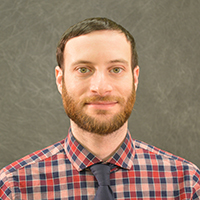
Fellowship Assignment: National Center for Injury Prevention and Control, Office of the Associate Director for Science
As a PHIFP fellow, Jeffery participates in developing, testing, and implementing the National Center for Injury Prevention and Control (NCIPC) Research Priorities Tracking System (RPTS). The NCIPC RPTS will serve as an internal tracking tool allowing the center to evaluate how NCIPC extramural and intramural research efforts are meeting center-wide research priorities. In addition to maintaining the RPTS, he will also oversee the development of the NCIPC Project Initiation Review (PIR) and Tracking Tool. This tool will be used as a concept clearance system to evaluate NCIPC intramural research. NCIPC will use both systems to evaluate the impact of its research portfolio and to identify new priorities to address in the future. Jeffery is also working with the Informatics Team in NCIPC’s Office of the Associate Director of Science to improve the team’s systems capacity to manage larger sets of data, increase the efficiency of data dissemination across NCIPC, data management planning, and training evaluation.
Prior to joining CDC, Jeffrey served as a project officer at the University of Kansas Research and Training Center on Independent Living where he deployed information systems to improve community conditions for people with disabilities. Additionally, he served as an ORISE Evaluation Fellow prior to joining the informatics fellowship.
Jeff received a doctoral degree in behavioral psychology from the University of Kansas where he studied behavioral systems analysis and community capacity building.
Megan Harrison, MPH, RDN
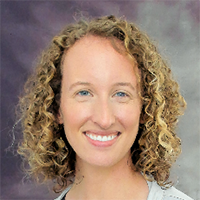
Fellowship Assignment: Denver Public Health as part of the Childhood Obesity Data Initiative (CODI) funded through CDC’s Division of Nutrition, Physical Activity, & Obesity (DNPAO)
As a PHIFP fellow, Megan supports efforts to build data capacity for comparative effectiveness childhood obesity research through the multi-sectoral integration of risk factor, intervention, and outcome data. Leveraging distributed data networks, CODI will merge clinical, community, and social determinants of health data to address critical research questions in childhood obesity prevention and management. CODI is being locally piloted in Denver, CO, with partners at the local, regional, and federal levels. The goal is to create a scalable national model through a Patient-Centered Outcome Research Institute (PCORI)-like environment.
Megan has eight years of experience providing technical nutrition support to non-communicable disease, obesity prevention, food security, and maternal and child health programs. Her work is grounded in the belief that health is a human right and she is driven to ensure all children have access to the nutritious foods and health services needed to reach their full potential. Megan’s work experience spans governmental organizations, academic institutions, acute healthcare systems, and international nonprofits, most recently including the CDC and Partners in Health.
Megan holds a bachelor’s degree in dietetics from Purdue University, a master’s of public health degree from the University of Minnesota, and is a Registered Dietitian.
Saugat Karki, MD, MS
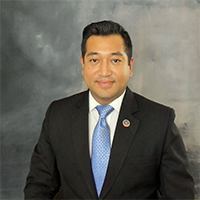
Fellowship Assignment: National Center for HIV/AIDS, Viral Hepatitis, STD, and TB Prevention, Division of Sexually Transmitted Diseases Prevention
As a PHIFP fellow, Saugat is working on electronic Case Reporting (eCR) of STDs, Clinical Decision Support (CDS) using eCR as a feedback loop, and exploring the automation of the clinical decision support of the serologic tests for syphilis.
Saugat is from Nepal, received his early education in India, and his medical degree from China. He practiced medicine in Nepal for three years. During this period, he took part in the 2015 Nepal earthquake disaster response, served as medical officer for visiting heads of state, and performed high altitude medicine, such as medevacs, apart from the regular clinical practice. He later enrolled in the Health Informatics program at the University of North Carolina at Charlotte, where he was appointed as a Graduate Fellow in the Academy for Population Health Innovation. There, he led efforts in developing and implementing public health informatics in the community, a REDCap database for local community partners, and a summer pilot project on Data Governance. He was also a Research Assistant in the Health Informatics lab and conducted research in decision support, ontology development, and knowledge representation of radiation therapy texts.
Xi Li, MD, MSPH

Fellowship Assignment: Center for Global Health, Global Immunization Division
As a PHIFP fellow, Xi is working in collaboration with the World Health Organization (WHO) and other global health partners to consolidate immunization and vaccine-preventable disease surveillance data sources, improve timeliness of reporting, and make better use of data through data triangulation, analyses and visualization.
Xi received her medical degree from Fudan University in China, a master’s degree in Global Disease Epidemiology and Control from Johns Hopkins University in the U.S., and a graduate certificate in Public Health Informatics. Before joining the CDC, Xi worked with WHO and the United Nations International Children’s Emergency Fund (UNICEF) as a consultant where she supported hepatitis B serological surveys, worked with national stakeholders in Mongolia and the Philippines to find strategies to improve immunization services in urban underserved areas, and gained experience in information management of health emergencies and event-based surveillance to detect potential outbreaks. Xi loves learning and explorations. In her spare time, she enjoys growing plants, wandering in forests, making things by hand and drawing.
Allison Moffitt, MPH
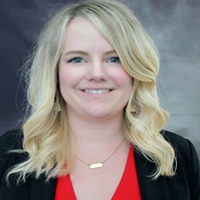
Fellowship Assignment: Center for Global Health, Division of Global HIV & TB
As a PHIFP fellow, Allison works on the Surveillance, Epidemiology, and Impact Measurement Team in the Global TB Branch within the Center for Global Health. She works with national TB programs in different countries to help them visualize their TB data more effectively in order to drive programmatic change. One project was to develop a District TB Dashboard to help empower local TB leadership in India to better care for their patients and drive down the incidence of TB in their locations.
Prior to becoming a PHIFP fellow, Allison was a Public Health Institute/CDC Global Health Fellow where she led the data visualization efforts for the President’s Emergency Plan for AIDS Relief (PEPFAR) in Cambodia and for Cambodia’s national HIV/AIDS program. Her career focus is transforming data into powerful data visualizations and decision tools that drive the development of international health strategies and improve on-the-ground programmatic implementation.
Before joining CDC, Allison received her master of public health degree in health behavior and health education at the University of Michigan.
Adebowale Ojo, PhD

Fellowship Assignment: Center for Global Health, Division of Global HIV & TB
As a PHIFP fellow, Adebowale works with the Health Informatics Team in the Health Informatics, Data Management, and Statistics Branch to support health informatics activities in President’s Emergency Plan For AIDS Relief (PEPFAR)-supported countries.
Adebowale holds a doctoral degree in information resources management with a specialization in health information management from Babcock University, Nigeria. He served on staff at Babcock University’s Information Resources Management Department where he researched and taught health information system courses, and coordinated the departmental postgraduate program. He completed a post-doctoral research fellowship at the University of KwaZulu-Natal, South Africa, where he worked on health information systems evaluation and mobile health (mHealth) assessment projects. Some of his PHIFP assignments include assessing the National Health Identification System in some PEPFAR-supported countries and evaluating a blood safety information system in Ghana and Lesotho.
Pradeep Podila, PhD, MS, MHA, FACHE
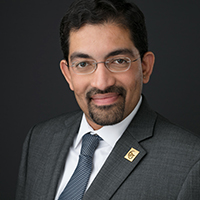
Fellowship Assignment: Denver Public Health as part of the Childhood Obesity Data Initiative (CODI) funded through CDC’s Division of Nutrition, Physical Activity & Obesity (DNPAO)
As a PHIFP fellow, Pradeep supports efforts to build data capacity for comparative effectiveness of childhood obesity research through the multisector integration of risk factor, intervention, and outcome data. Leveraging distributed data networks, CODI will merge clinical, community, and social determinates of health data to address critical research questions in childhood obesity prevention and management. CODI is being locally piloted in Denver, CO, with partners at the local, regional, and federal levels. The goal is to create a scalable national model through a Patient-Centered Outcome Research Institute (PCORI)-like environment.
Pradeep has nearly eight years of experience as a Senior Data Specialist analyzing utilization and quality reports for reducing care variation, developing clinical data solutions and performance metric reporting, and supporting physicians and researchers on research grants and studies related to super-utilizers/frequent flyers, sickle cell disease, liver/kidney transplants, non-alcoholic fatty liver disease (NAFLD), and healthcare disparities. Since 2015, he has been a volunteer adjunct faculty teaching Managerial Epidemiology, Health Policy, and Health Data Analytics to Master of Health Administration students in the Division of Health Services Management and Policy at the University of Memphis. He is a fellow of the American College of Healthcare Executives, certified in Six Sigma Black Belt, and served as Baldrige Board of examiners with the Tennessee Center for Performance Excellence from 2016-2017. As a part of CDC’s Population Health Training-in-Place Program (Class of 2016) he developed analytic infrastructure from electronic health records (EHR) data to study the impact of latency in the transition from pediatric to adult care settings on healthcare utilization and costs in sickle cell patients in the Memphis/Shelby County region.
Pradeep has a doctoral degree in epidemiology, a master of science in degree in electrical/biomedical engineering, and a master of health administration degree from the University of Memphis.
Jihye (Hana) Shin, MPH

Fellowship Assignment: National Center for HIV/AIDS, Viral Hepatitis, STD, and TB Prevention, Division of Tuberculosis Elimination
As a PHIFP fellow, Jihye Hana Shin works on projects that involve the assessment of laboratory information management system functions and identifying interoperability solutions to provide a scalable mechanism by which the data files that accompany the required studies can be efficiently transferred.
Before joining PHIFP, she worked at local health agencies in New York City and Philadelphia on implementing evidence-based strategies designed to increase accountability through quality improvement, performance monitoring, and program evaluation.
She completed a master of public health with a concentration in epidemiology at Columbia University.
Oluwasegun Adegoke (Joel), MS
Fellowship Assignment: Center for Global Health, Global Immunization Division
Joel supports multiple projects, such as developing a geographic information system (GIS) tool (for enumerating , sampling and offline navigation) for geo-sampling projects, supporting (Concept, development & testing) a Stop Transmission of Polio (STOP) program vaccine-preventable diseases (VPD) activity tracking tool and custom report, STOP data management training, a District Health Information Software 2 (DHIS2) platform for VPD surveillance projects and other health information system evaluation projects.
Prior to becoming a PHIFP fellow, Joel worked at the African Field Epidemiology Network (AFENET) as a senior data manager for the National Stop Polio Transmission Program (NSTOP) in Nigeria. In this position, he established an immunization module and dashboard and worked with the Ministry of Health and National Primary Health Care Development Agency to integrate it with the National Health Management Information System on the national District Health Information System platform.
Joel holds a master’s degree in environmental and public health from the University of Salford, Manchester in Salford, Greater Manchester, England.
Tonny Bogere, MS
Fellowship Assignment: Center for Global Health, Global Immunization Division
As a PHIFP fellow, Tonny provides technical assistance to the Nigeria country team performing a SWOT analysis (Strengths, Weaknesses Opportunities, Threats) of polio immunization surveillance systems. He assesses the team’s needs surrounding data and information knowledge, and evaluates the team’s resource utilization to help them improve the reporting quality of the data and promote evidence-based decision-making in public health.
Prior to becoming a PHIFP fellow, Tonny worked in CDC’s Uganda country office. He has over 10 years of experience developing, deploying, managing, and implementing health information systems. He provided hands-on support to the Ministry of Health in Uganda to develop, customize, and implement the first ever national integrated Electronic Health Management Information System (eHMIS) on the District Health Information System (DHIS 2).
Tonny holds a master’s degree in public health informatics from the University of Sheffield in Sheffield, South Yorkshire, England.
Wilfred Bonney, PhD
Fellowship Assignment: National Center for HIV/AIDS, Viral Hepatitis, STD, and TB Prevention, Division of Tuberculosis Elimination
As a PHIFP fellow, Wilfred works with the Data Management, Statistics and Evaluation Branch where he is involved in the design and implementation of data exchange formats for molecular detection of drug-resistant tuberculosis.
Wilfred holds a doctoral degree in information technology from Capella University. He completed post-doctoral work at the University of Dundee in Dundee, Scotland, United Kingdom that included analyses linking phenotypic data (clinical information) from electronic medical records with genotypic data (genomic information) to predict dementia. He is affiliated with HL7 International and is a certified HL7 V3 RIM Specialist. He is also a professional member of the British Computer Society.
Carl Grafe, MS, PhD
Fellowship Assignment: Utah Department of Health
As a PHIFP fellow, Carl is assigned to a field location as part of CDC’s Population Health Workforce Initiative. He is working on projects to optimize the Utah Medicaid High Utilizers Program and evaluating Utah’s Syringe Exchange Program. In this assignment, he engaged stakeholders to develop project and data analysis plans, analyzed chronic disease combinations (based on Elixhauser Comorbidities) to determine which were most impactful based on differences in standard deviation cross plans, and projected costs/savings resulting from implementation of interventions identified in the literature and proposed targeted interventions for each super-utilizer subpopulations, ranked according to the projections.
As an epidemiologist and informatician, he gained experience supporting systems for communicable disease reporting, biosurveillance, and outbreak response, as well as providing analytic support for local policy development.
Carl earned a master’s degree in epidemiology from the University of Oklahoma Health Sciences Center and worked in local public health for several years while pursuing a doctoral degree in biomedical informatics from the University of Utah.
Stefan Hochwarter, MSc
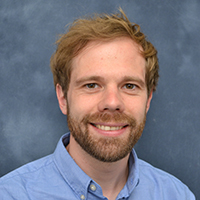
Fellowship Assignment: National Center for Environmental Health, Division of Environmental Hazards and Health Effects
As a PHIFP fellow, Stephan supported the development of the National Environmental Public Health Tracking Portal. He used modern technology to collect, analyze, and present environmental and health data to strengthen healthy informed communities.
Prior becoming a PHIFP fellow, Stefan ran his own enterprise specializing in mobile and web development for healthcare applications. He earned his master’s degree in medical science with a major in health informatics at the Karolinska Institutet in Stockholm, Sweden.
Jose Tomas Prieto, PhD
Fellowship Assignment: Denver Health
As a PHIFP fellow, José Tomás is assigned to a field location as part of CDC’s Population Health Workforce Initiative. He works on projects to coordinate community treatment and policy interventions related to opioids. Stationed in Denver Health, José Tomás focuses on advancing multidisciplinary data science and informatics research using traditional and non-traditional data sources at hospital and population levels.
Prior to becoming a PHIFP fellow, José Tomás was a data science regional manager at the Center for Health Studies of Universidad del Valle de Guatemala (UVG) in Guatemala. In this position, he led public health informatics and health economics research in the influenza and HIV programs, and published work about the viability of crowdsourcing health data in Central America. José Tomás is a computer science engineer and has worked on a variety of public health research and economic evaluations projects in Latin America, Europe and Africa. While completing his PhD, José Tomás devised, launched and published a mobile-health (mHealth) field experiment that evaluated the effects of waiting times on the demand for electronic services among mothers with newborns. He also conducted and published mobile-health research during a research visit at Imperial College London, UK, sponsored by Ecole Polytechnique; here, he evaluated the quality and precision of health and wellness apps in the UK’s National Health System. This work was featured in the BBC, the Independent, and other news media in 2015.
He holds masters and doctoral degrees in economics and management from Ecole Polytechnique in Palaiseau, France.
Faisal Reza, MS, PhD
Fellowship Assignment: Center for Surveillance, Epidemiology, and Laboratory Services, Division of Scientific Education and Professional Development
As a PHIFP fellow, Faisal is assigned to the Population Health Workforce Branch in the Division of Scientific Education and Professional Development. He serves as an informatics resource for short-term technical assistance projects at CDC and at state and local health departments. He also serves as a subject matter expert to strategic informatics projects across CDC. These include data preparedness and integrated response across CDC centers and with CDC’s federal and international partners. His project work includes applying agile management approaches to data management for developing opioid response plans for a state health department, serving as a data management expert for outbreak investigations, and as an informatics subject matter expert for workforce development and management information systems. He has co-led workshops on teaching problem solving in public health informatics and has research interests in the use of data science methods in public health.
Faisal is a doctoral level fellow trained in multiple scientific, engineering, and technological disciplines from Massachusetts Institute of Technology (MIT), Duke University, and Yale University. He has led programs, teams, and projects in the academic, private, and public sectors.
Kamran Ahmed, MD
Fellowship Assignment: National Center for Injury Prevention and Control, Division of Violence Prevention
As a PHIFP fellow, Kamran provided ongoing data system development, analysis, and monitoring the Prevention, Practice and Translation Branch to ensure that reporting systems aligned with project requirements.
Kamran’s area of informatics expertise is computational epidemiology. Over the past seven years, he has worked with United Nations agencies in variety of public health professional capacities in several countries. He has contributed to conceptualizing, developing, and implementing an electronic surveillance information system for disease early warning programs.
Kamran earned his medical degree from Liaquat University of Medical & Health Sciences in Jamshoro, Pakistan and a master’s degree in preventive medicine from Orebro University in Örebro, Sweden.
Amarnath Babu, MD, MPH
Fellowship Assignment: Center for Global Health, Division of Global Health Protection
As a PHIFP fellow, Amarnath worked on early warning alert and response systems and integrated disease surveillance systems by developing disease surveillance standards as part of a World Health Organization (WHO) cooperative agreement. He also provided informatics assistance to the WHO Regional Office for Africa for electronic Integrated Disease Surveillance and Response guideline development and WHO Nepal by evaluating disease surveillance systems and suggesting a roadmap to use information systems to improve integrated disease surveillance in Nepal.
Amarnath has more than 11 years of public health experience doing work related to strengthening health information systems. He spent the first eight years of his career working for the Government of Tamil Nadu in India, as a physician at a primary health care center in a rural village. He went on to manage a health management information systems (HMIS) project, responsible for planning, developing, and implementing electronic health records across 270 government hospitals in India. One of his notable accomplishments from the HMIS project was creating a cadre of district level information technology (IT) technical coordinators, a first of its kind, to provide IT technical and training support for hospitals in India. The cadre played a vital role in ensuring sustainability and continued support for health management information systems. This effort has been successfully institutionalized within the Indian government.
Amarnath is a medical doctor with a master’s degree in public health with a concentration in Health Policy Economics and Finance from the Tata Institute of Social Sciences in Mumbai, India.
Kenneth Blaylock, MPH
Fellowship Assignment: Center for Global Health, Division of Global Health Protection
In Ken’s fellowship assignment, he provided informatics support through data analytics to the Global Rapid Response Team and the Emergency Response and Recovery Branch, by researching and reporting data in an ongoing crisis and to provide situation reports for deployments. He also provided various types of visualizations from Pivot tables to geographic information system (GIS) travel moves. He also developed international partnerships to use deployment data for response events.
Prior to becoming a PHIFP fellow, Kenneth was an Association of Schools and Programs in Public Health (ASPPH) Informatics fellow in the Division of Global HIV and TB, also in the Center for Global Health. Before coming to CDC, he spent 25 year as a software engineer at Hewlett-Packard (HP) where he designed software for various storage and operating systems groups. After leaving HP, he joined the Peace Corps and served in Ethiopia as an HIV/AIDS education Information and Communication Technology volunteer. Kenneth attended the Tulane School of Public Health and Tropical Medicine and obtained his master’s degree in epidemiology.
Lisa Murie, MS
Fellowship Assignment: Center for Global Health, Division of Global HIV & TB
Lisa’s work is focused on routine HIV case surveillance to support the goal of HIV/AIDS epidemic control in global health. Lisa is a health informatician with extensive experience designing, developing, and implementing electronic medical records.
She received her master’s degree in health informatics from Karolinska Institutet in Stockholm, Sweden.
Wycliffe Odongo, MS
Fellowship Assignment: Center for Global Health, Division of Global Health Protection
Before joining CDC as a PHIFP fellow, Wycliffe was a senior data manager and deputy section head at the Kenya Medical Research Institute (KEMRI) where he supported the collection, management, analysis and dissemination of Malaria research data for more than six years.
His professional experience includes systems development, analysis and design, evaluation, and testing, with a keen interest in open-source systems for disease surveillance in poor resource settings. Wycliffe also initiated, built, and continues to support several mobile phone-based initiatives and solutions for disease surveillance at both community and facility levels in East Africa and South America.
Wycliffe holds a master’s degree in computer science from Maseno University in in Kisumu, Kenya.
Linda Roesch, MPH
Fellowship Assignment: Office of the Deputy Director for Public Health Science and Surveillance
As a PHIFP fellow, Linda developed a solution that reduces data loss and recaptured data in state and local health programs to support chronic disease prevention. She also explored tools that automate and reduce the amount of time to validate data submitted by grantees and reduce the amount of time until the data are made available to the stakeholders. Prior to becoming a PHIFP fellow, Linda worked as a Research Fellow in CDC’s Division for Heart Disease and Stroke Prevention where she was charged with collecting clinical quality measures from multiple data sources to monitor the progress of the Million Hearts® initiative. She developed an interactive, web-based dashboard to allow leadership at the Department of Health and Human Services (HHS), CDC, and their private and public partners to monitor progress toward meeting clinical targets over the course of the Million Hearts® initiative. In 2014, Linda was on an HHS Ignite Accelerator team that explored ways to use data from Electronic Health Records (EHRs) to create data visualization tools to support decision-making for public health and health care organizations. The team collaborated with primary care physicians, and others, as well as leveraged business intelligence tools, to develop a mechanism to integrate data from multiple systems and provide actionable feedback for providers and health care administrators.
Linda earned her master’s degree in public health from DePaul University.
Yvette Blanche Temate, PhD
Fellowship Assignment: Center for Surveillance, Epidemiology, and Laboratory Services, Division of Scientific Education and Professional Development
Yvette’s primary focus is workforce statistical analysis, data governance, and dissemination related to fellowships in the Division of Scientific Education and Professional Development. One of her main projects is to build a searchable data catalog from the extensive data inventory she conducted in her branch to promote data-driven program planning and implementation.
Yvette is a computer scientist who previously worked as a software engineer and as a data analyst. She received her master’s degree in information systems from Télécom ParisTech in Paris, France. She completed her doctoral studies in artificial intelligence and computer science from Georgia State University.
Loretta Amadi, MSc
Fellowship Assignment: Center for Global Health, Division of Global Health Protection
Loretta served as the informatics subject matter expert in three Global Health Security Agenda countries: Egypt, Bangladesh, and Nigeria. She worked closely with Ministries of Health and CDC country offices in these countries to design, implement, upgrade, and optimize surveillance and health information management systems. Her work impacted systems development at the national, state, district and communities within each country.
Loretta has over ten years of experience in the field of health informatics, having worked in pharmaceutical, biomedical, and clinical informatics. Prior to joining CDC, she was the Lead Information Technology Solutions Analyst in Decision Support at DaVita HealthCare Partners where she finalized the design, implementation, reporting, and training of authorization systems that replaced General Electric IDX Systems applications. Her work saved more than $10 million in maintenance and consulting while reducing system failures. In her role as Regional Clinical Data Manager at Eli Lily Pharmaceuticals, Loretta applied specialized therapeutic area knowledge to review and validate clinical trial data to ensure database consistency and accuracy.
Loretta earned a master’s degree in health informatics from Indiana University – Purdue University Indianapolis and a bachelor’s degree in computer science from Alabama Agricultural and Mechanical University.
Usman Mohammed, MSc
Fellowship Assignment: National Center for Injury Prevention and Control, Division of Analysis, Research, and Practice Integration
Usman helped strategize ways to manage the flow of data through information systems to better understand the scope of an injury or violence problem and measure how well prevention efforts are working to identify emerging public health issues. In the National Center for Injury Prevention and Control, Usman facilitated an assessment of an enterprise data management strategy for the Statistics, Programming and Economics Branch allowing staff to better capture the data management life cycle flow across the branch.
Prior to becoming a PHIFP fellow, Usman was a United States Peace Corps Volunteer in Ethiopia as a. He earned his master’s degree in urbanisation and development from the London School of Economics and Political Science and his bachelor‘s degree in information technology from Northeastern University.
Ester Mungure, MSc
Fellowship Assignment: Center for Global Health, Global Immunization Division
As a PHIFP fellow, Ester reviewed and assessed mobile data capture technology for routine immunization monitoring. She also provided technical assistance on health management information systems to Ministries of Health.
Prior to joining CDC, Ester worked as a Senior Data Manager at the Harvard T.H. Chan School of Public Health where she led the implementation of electronic medical record systems for HIV clinics in Tanzania and Swaziland. Ester earned a master’s degree in computer science from the University of Northern Iowa.
George Odongo, MPH
Fellowship Assignment: Center for Global Health, Division of Global Health Protection
As a PHIFP fellow, George designed integrated information systems solutions for priority disease surveillance in Global Health Security Phase I countries. He worked with local partners in Uganda to implement linked-data systems for Acute Febrile Illness surveillance and an event-based registry system for early detection and notification of epidemic-prone diseases. In Kenya, he provided technical support for data management and analysis of surveillance data for population-based infectious disease surveillance. George also worked with the World Health Organization Regional Office for Africa (WHO-AFRO) technical team to analyze data collected during survey activity in five African countries to assess their technological situational capacities to conduct national and local electronic surveillance at all health administrative levels.
Prior to this position, he worked in the CDC Uganda Country Office for 15 years where he specialized in data management and analysis for CDC research projects. He also served as monitoring and evaluation specialist for the U.S. President’s Emergency Plan for AIDS Relief (PEPFAR) program in Uganda where he worked closely with the Ministry of Health and several partner organizations to provide strategic information solutions for HIV program monitoring and reporting. George earned a master’s degree in public health with concentration in epidemiology from the University of Liverpool in Liverpool, England. He earned his bachelor’s degree in statistics from Makerere University in Kampala, Uganda.
Anais Tanon, PhD
Fellowship Assignment: CDC’s Office of the Associate Director for Science
Anais participated in various informatics projects including information technology strategic planning and open data. She has an extensive background in statistics, health services administration, health care systems and organizations research, program evaluation, computer programming and public health.
Before coming to CDC, Anais worked as a Scientific Coordinator at the RUIS McGill Centre of Excellence on Longevity (previously the Centre of Excellence for Aging and Chronic Disease of RUIS McGill). Anais attended the University of Montreal where she earned a doctorate in public health and a master’s degree in health administration. She also completed a post-doctoral fellowship in international health at the Harvard T.H. Chan School of Public Health.
